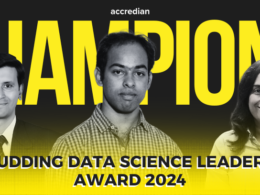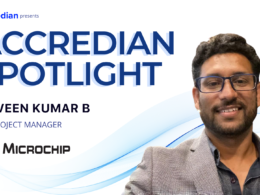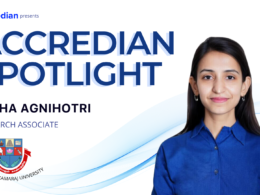With over eight years of work experience, Rahul Adwani has handled almost all business processes, from sales and marketing to data analytics. Realizing the urgent need for data science to optimize them, he finally decided to go for an artificial intelligence and data science course and enrolled for the Global Certificate in Data Science & AI (GCDAI) program at Accredian.
In this interview, lets see what he interests him about data science the most and how his experience has been at Accredian.
Question 1: Which program & batch are you part of at Accredian & tell us more about your current work profile?
Rahul: I am part of the Global Certificate in Data Science & AI (GCDAI) program, March 2020 batch. I am currently part of the business intelligence and analytics team at Yes Bank Limited.
I support the bank’s digital marketing team to devise and run marketing campaigns. It’s one of my primary responsibilities to keep the digital marketing platform up and running and keep the system free from any kind of audit observations.
The second most important responsibility that I have is to provide the campaign team with all the data points that are required to segment the customers to personalize the content of the campaign and measure its effectiveness. I also supply data to the AI and ML team so that they can perform customer segmentation and other required functions efficiently.
The third, and the last important responsibility that I have is that I perform POCs on the marketing system and integrate it with other systems of the bank. And I’m responsible for taking care of all the developments like API developments to the production environment.
Question 2: Walk us through your career journey & what got you interested in Data Science & Machine Learning?
Rahul: I started my career with L&T Infotech in 2010, as a software engineer working on a project to develop a business intelligence and data visualization platform. I worked there for almost two and a half years and then moved on to pursue my higher studies.
Post MBA, I was hired for the position of a senior manager at Yes Bank as a campus recruit, where I worked for revamping the digital channel of the bank, particularly its corporate website. After this I moved to Neterwala Consulting and Corporate Services Limited where I got exposure to multiple industries and projects.
It included sales, acquisitions, asset management, estate management, data analytics, operations, management, etc. After spending two years at NGC, I moved to Yes Bank and here I started with leading the implementation of the digital marketing automation platform, and currently I am managing the platform from data maintenance and reporting perspectives.
Throughout my career, I have experienced almost all business processes and none of them can be managed smoothly without having an analytical perspective. Data science and machine learning are the next big areas in the field of data analytics. And that’s why an artificial intelligence and data science course is inevitable.
And in simple words, if I need to do my job in the best possible manner and excel in my field, I need to do this by using data science and data analytics and machine learning. And hence, I chose to pursue data science and machine learning.
Question 3: What all tools and packages in Data Science & Machine Learning have you mastered in your Data Science & AI program at Accredian so far?
Rahul: As far as the tools and packages in this artificial intelligence and data science course are concerned, I would not say that I have mastered them, but I have used multiple tools like Jupyter Notebook, Google Collab Notebook, and Azure Machine Learning Studio. And there are certain tools like AWS Comprehend, AWS Polly, AWS Lex that I have used, which are part of the Auto ML services provided by AWS. Regarding the packages, I would say that I’ve used libraries like Pandas, Seaborn, Matplotlib, Plotly, scikit-learn, NumPy and stats models.
Question 4: What were some of the initial challenges when you got started on your Data Science journey and how did you overcome it?
Rahul: I faced two major challenges when I wanted to start with the artificial intelligence and data science course at Accredian. First was the financial challenge. After two months of deliberation, and consulting with other people and reading reviews on social media, I finally decided that I would go with Accredian and I would enroll in their GCDAI program.
The program, the fees of the program was a little on the higher side. But luckily, I found out that the Accredian team was conducting a webinar. And I attended that and at the end of the webinar, I was provided with a 70% discount on the tuition fee. And, I was very much interested so I went ahead and enrolled myself. Even at the time of the fee payment, they gave me another discount, which was equal to the interest fee that I would have paid while converting their fees to EMI. So, that was really great.
The second challenge was what I faced on the personal front and it was actually bigger than the financial challenge. This challenge was to convince my family that I would be spending next 50 weekends on the laptop screen rather than spending time with them. Well, fortunately, or unfortunately, the entire country went into lockdown. A few days after, I enrolled for the GCDAI program and it was actually a blessing in disguise for me.
Question 5: Who is your favorite faculty at Accredian and what did you learn from him the Most?
Rahul: My favorite faculty at Accredian is Mr. Suchit Majumdar. The most important thing that I learned from him is, metaphorically speaking, to catch fish. We have all heard about the saying that give a man a fish and you feed him for a day, but teach a man how to fish and you feed him for a lifetime. Suchit always gave his students the best fishing equipment and the most efficient ways to use them. And on top of that, he will make you catch hundreds of fishes during his class.
Question 6: What is the goal of Data Science?
Rahul: Like any other scientific field of study, data science also involves a lot of experimentation and exploration. Data science is actually a field which lies at the intersection of software engineering, mathematics and domain knowledge. The goal of data science is to experiment and explore as many new and efficient solutions to solve the business problems across all kinds of industries and across all kinds of business processes and verticals.
Question 7: In your view, how has Data Science evolved in the last few years?
Rahul: When I started my career in 2010, I worked as a software developer in a project for building business intelligence and data visualization platforms. At that time, we used to diagnose a business problem using data analytics. And we used to call it diagnostic analytics.
In the last 10 years, the data science domain has moved from diagnostic analytics to predictive analytics to prescriptive analytics to cognitive analytics. When I say cognitive analytics, I mean, the machine in the data science domain, now not just employs the machine learning algorithms, but it even employs the human understanding to solve a business problem.
For example if you want to build a recommendation system that offers users book recommendations, then the algorithm of the machine would not just understand the particular use of words liked by the customers but also the context in which those books were written.
There are certain services like AWS Comprehend or AWS Polly, or some services given by Microsoft Azure or IBM Watson, that are there in the cognitive analytic space in today’s world.
Question 8: What are the current trends in Data Science that you are most excited about?
Rahul: The current trends in the data science domain that I’m most excited about are the new Cognitive Services and the applications that are quickly being introduced by the tech giants of the world around it.
A recent introduction was AWS Textract. It can actually read your handwriting and infer the text out of it. Imagine the time this would save to convert meeting notes to a full fledged business requirement document or the time it would save to digitize the notes from historical documents. It’s simply amazing!
Question 9: Which are some of the blogs that you follow?
Rahul: During and even after my artificial intelligence and data science course at Accredian, I follow YouTube channels called AIEngineering and neuron.ai. I am on our WhatsApp group called Robified. But the most important study material that I visit, revisit and revise again and again are the study materials that are given by the Accredian faculties, especially the class recordings and the pre read and the post read parts given by them.
Question 10: What is your advice to anyone wanting to start a career in Data Science?
Rahul: I would like to give four pointers to the people who are starting their artificial intelligence and data science course. First, master the basic concepts like linear algebra statistics. If you’re strong in basic concepts, then the complex concepts like support vector machines or neural networks will come in very easily.
Second, be tenacious. You need to cling to the goal of being a data scientist, no matter how hard the challenges are. There are people who are ready to solve the problems that you have. And there are people who are already going through the same problems that you have. So, you just need to find the right platform where you can identify those people and the solutions to your problems.
Third, get experimental. If you’re given two algorithms to solve one problem, use both of them and then learn five more algorithms and use those as well. Compare them and learn from them. Finally, join an artificial intelligence and data science course and learn from your peers and experts in the field. If needed, join a school like Accredian.
This was a conversation with one of our GCDAI students – Rahul Adwani.
To read more such fascinating student stories, check out Accredian Spotlight.






Superb
Well Done